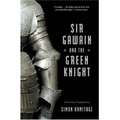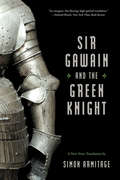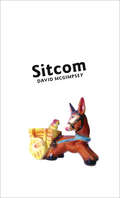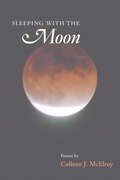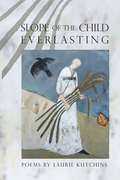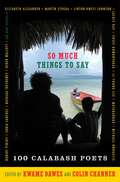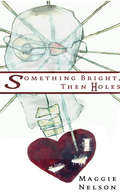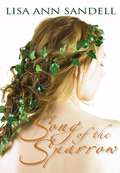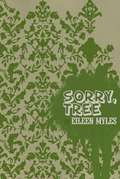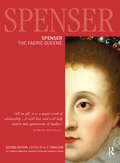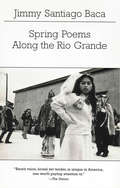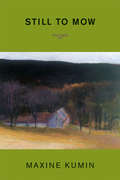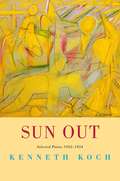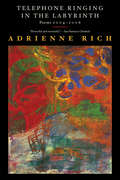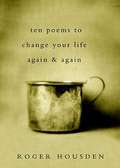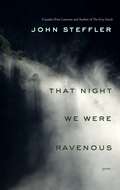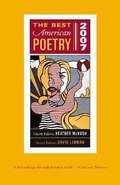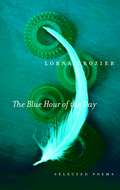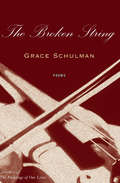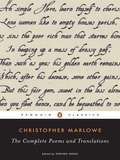- Table View
- List View
Sir Gawain and the Green Knight: A New Verse Translation
by Simon ArmitageA poetic translation of this six-hundred-year-old Arthurian story of beheading, romance, and the supernatural.
Sir Gawain and the Green Knight: A New Verse Translation (Faber Poetry Ser.)
by Simon Armitage"Compulsively readable. ... Simon Armitage has given us an energetic, free-flowing, high-spirited version."--Edward Hirsch, New York Times Book Review One of the earliest great stories of English literature after ?Beowulf?, ?Sir Gawain? is the strange tale of a green knight on a green horse, who rudely interrupts King Arthur's Round Table festivities one Yuletide, challenging the knights to a wager. Simon Armitrage, one of Britain's leading poets, has produced an inventive and groundbreaking translation that "[helps] liberate ?Gawain ?from academia" (?Sunday Telegraph?).
Sitcom
by David McgimpseyImplicating extremes from Coriolanus to Karen Carpenter, David McGimpsey's Sitcom is both serious poetry and a work of comedy. Mischievous, generous and side-splittingly funny, this collection of wry soliloquies and sonnets begins with a milestone birthday and finds itself in demi-mondes as varied as the offices of university regents and the basic plot arc of Hawaii Five-O - offering, along the way, a sincere contemplation of mortality and the fashion sense of Mary Tyler Moore. Unembarrassed by its literary allusions or its hi-lo hybridity, Sitcom's strategic and encompassing voice is prepared for each comedic disaster and is, somehow, always ready for next week's episode.'McGimpsey displays erudition, clever insights and a knack for the wickedly funny wisecrack.'- The Washington Post'[McGimpsey] finds the humanity hiding in the hilarity. This guy is as funny as David Sedaris, and more inventive.'- The Ottawa Citizen
Sleeping with the Moon (Illinois Poetry Series)
by Colleen J. McElroyPEN Oakland National Literary Award, 2008 Colleen J. McElroy's poetry shoots for the moon, and takes it in, too, in one way after another. The collection’s award-winning poems animate women’s experiences of sex, shopping, and dancing, while offering telling insight into the struggles and silver lining of lust, love, illness, and aging. Rich with vivid imagery and candid storytelling, Sleeping with the Moon takes readers on moonlit adventures under the night sky, through the barroom’s smoky haze, and under the covers. ...Beware: such delicate sights have driven more than one woman to despair instead she watched him breathe-- relishing for a moment that secret space where night grows soft and the moon’s detumescence forgives-- and where if this jeweled light holds they might strip themselves of years if only for one night --from “In Praise of Older Women”
Slope of the Child Everlasting (American Poets Continuum)
by Laurie KutchinsSlope of the Child Everlasting sustains the lyric and imagistic sensibility of Laurie Kutchins’ previous poetry collection, The Night Path (BOA Editions, 1997), while expanding on its exploration of the archetypes that anchor the heart and mind of her poetry. The characters in these poems evoke chaos and regression, as well as song, wonder, and the tenacity of the imagination. Laurie Kutchins is an associate professor of English at James Madison University in Virginia. She lives in Harrisonburg, Virginia, and spends her summers along the Wyoming-Idaho border. The Night Path won the 1997 Isabella Gardner Award from BOA Editions.
So Much Things to Say: 100 Poets From The First Ten Years Of The Calabash International Literary Festival
by Colin Channer Kwame DawesRobert Pinsky and Derek Walcott anchor this groundbreaking, soulful poetry collection. Contributors include: Robert Pinsky, Derek Walcott, Elizabeth Alexander, Amiri Baraka, Martin Espada, Terrance Hayes, Valzyna Mort, Sonia Sanchez, Linton Kwesi Johnson, Patricia Smith, Saul Williams, Staceyann Chin, and 88 others. Imagine a night of a hundred poets reading their work to an audience of intensely engaged, responsive, and lively people. Imagine the reading taking place under a tent pitched on a grassy lawn that overlooks the Caribbean Sea. Imagine the sun setting, imagine the scent of curried goat and fried fish wafting through the air, imagine the heat, imagine the cool tongue of wind off the sea, imagine a stage like an ancient shrine with a podium artfully pieced together with bamboo, strips of still green wood, leaves, twine, and shells. Imagine one hundred poets, some whose names you know and some you have never heard of, stepping onto the stage, opening their mouths and hearts, and singing out poems of such variety, complexity, beauty, and passion. This is what a poetry reading at the Calabash International Literary Festival is like, and this new anthology provides readers a taste of what this festival offers year after year. Edited by Kwame Dawes and Colin Channer, two of the founders of the festival, this is an exciting example of Calabash's commitment to create a festival that is diverse, inspirational, earthy, and daring each May. This anthology is at once a celebration of ten years of a remarkable literary event as it is a gesture of love to seek ways to continue to fund and support this festival for the future. All profits from this publication will go toward the running of the festival, which remains free and open to the public.
Something Bright, Then Holes
by Maggie NelsonMaggie Nelson's fourth collection of poems combines a wanderer's attention to landscape with a deeply personal exploration of desire, heartbreak, resilience, accident, and flux. Something Bright, Then Holes explores the problem of losing then recovering sight and insight - of feeling lost, then found, then lost again. The book's three sections range widely, and include a long sequence of Niedecker-esque meditations written at the shore of a polluted urban canal, a harrowing long poem written at a friend's hospital bedside, and a series of unsparing, crystalline lyrics honoring the conjoined forces of love and sorrow. Whatever the style, the poems are linked by Nelson's singular poetic voice, as sly and exacting as it is raw. The collection is a testament to Nelson's steadfast commitment to chart the facts of feeling, whatever they are, and at whatever the cost.
Song of the Sparrow
by Lisa Ann SandellSince she was a small child, Elaine has been the only woman living in a military camp with hundreds of men. When her mother died, her father took Elaine and her brothers to Arthur's camp, where she regularly mingles with people who are now legends.
Sorry Tree
by Eileen MylesMyles' trademark punk-lesbian sensibility and intimate knowledge of poetic tradition are at work in this eighth collection, where every love poem is political, and every political poem is, ultimately, about love.
Spenser: The Faerie Queene (Longman Annotated English Poets)
by A. C. HamiltonThe Faerie Queene is a scholarly masterpiece that has influenced, inspired, and challenged generations of writers, readers and scholars since its completion in 1596. Hamilton's edition is itself, a masterpiece of scholarship and close reading. It is now the standard edition for all readers of Spenser. The entire work is revised, and the text of The Faerie Queene itself has been freshly edited, the first such edition since the 1930s. This volume also contains additional original material, including a letter to Raleigh, commendatory verses and dedicatory sonnets, chronology of Spenser's life and works and provides a compilation of list of characters and their appearances in The Faerie Queene.
Spring Poems Along the Rio Grande
by Jimmy Santiago BacaIn Spring Poems Along the Rio Grande, Jimmy Santiago Baca continues his daily pilgrimage through the meadows, riverbanks, and bosques of the Rio Grande where winter dies, spring explodes, and inextricable links between the human spirit and the natural world are revealed. In Spring Poems Along the Rio Grande, Jimmy Santiago Baca continues his daily pilgrimage through the meadows, riverbanks, and bosques of the Rio Grande where winter dies, spring explodes, and inextricable links between the human spirit and the natural world are revealed--"the river and I see through each other's skins / behind the eyes into the tunnels of water-bone and rushing marrow." These poems expand upon those in Baca's recent Winter Poems Along the Rio Grande -- his visions of love and loss, poverty and renewal, redemption and war are reflected in the rocks, trees and animals of his beloved New Mexico. In Spring Poems the words of the river "rise around thorny thickets / then descend again into the burbling stubble," and the poet surrenders himself to this place where his own words are woven by "a thumbnail-sized yellow spider/ with poppy seed eyes." Born in New Mexico of Chicano and Apache descent, Jimmy Santiago Baca was raised first by his grandmother, but was later sent with his brother to an orphanage. A runaway at age thirteen, it was after Baca was sentenced to five years in a Federal prison at the age of twenty-one that he began to turn his life around: there he learned to read and write and found his passion for poetry. His memoir A Place To Stand won the prestigious International Award. He is Champion of the International Poetry Slam and winner of The Before Columbus American Book Award and the Pushcart Prize.
Still to Mow: Poems
by Maxine Kumin"Kumin writes ... with the clear gaze of a journalist and the ire of an activist.... Filled with love."--Christian Science Monitor Here Maxine Kumin's signature nature poems are shaken up and invigorated by the darker, human realities. Both "delicate and powerful" (Library Journal), she faces with equanimity the disappointments and joys of sixty years of marriage--ending with the unspoken question of "Which of us will go down first."
Sun Out: Selected Poems 1952-1954
by Kenneth KochMr. Koch's poems have a natural voice, they are quick, alert, instinctive . . . He has vivacity and go, originality of perception and intoxication with life. Most important of all, he is not dull." --Frank O'Hara, Poetry, 1955Gathered together for the first time, the exciting, startling early work of one of our finest poets. Writing as a young man in the 1950s, Koch, a member of the now famed New York School along with John Ashbery, Larry Rivers, Frank O'Hara, and others, experimented with the delicate balance between sound and sense to offer a series of poems resembling music or abstract painting. For example, he opens the title poem with: "Bananas, piers, limericks / I am postures / Over there, I, are / The lakes of delectation / Sea, sea you!"Also included are a selection of short plays in verse and Koch's innovative masterpiece, "When the Sun Tries to Go On," a poem that "produces a radical reworking of the life-poem myth predominant in American poetics since 'Song of Myself'" (William Watkins, In the Process of Poetry). About "When the Sun Tries to Go On," David Lehman wrote, "Koch takes a great deal of delight in the sounds of words and his consciousness of them; he splashes them like paint on a page with enthusiastic puns, internal rhymes, titles of books, names of friends, and seems surprised as we are at the often witty outcome" (Poetry, 1968).When the poems in Sun Out were originally published, they set a standard for the freshness and surprise of language used in extraordinary ways. For almost five decades they have delighted readers lucky enough to find them. It is our pleasure to make them once again available in this new and provocative collection.From the Hardcover edition.
Telephone Ringing in the Labyrinth: Poems 2004-2006
by Adrienne Rich"Rich's lyrics are powerful and mournful, drenched in memory." --San Francisco Chronicle To view text with line endings as poet intended, please set font size to the smallest size on your device.
Ten Poems to Change Your Life Again and Again
by Roger HousdenEvery great poem invites us to step beyond what we know, what we think we can dream or dare. Great poetry is a catalyst for change: a change of mind, a change of heart, a change of life- and yes, over and over, again and again, with each new reading, and each new phase of our journey. That’s why poetry is dangerous. It gives voice to our unspoken dreams; it is a mirror to our own deepest joys, desires, and sorrows. It can tip us over into a new life, into a new way of seeing and being, that a moment ago we might even have had no words for. In this new volume of his Ten Poems series, Roger Housden takes ten great poems and in personal, intimate essays shows how they led him, and can also lead us, into a more deeply lived and examined life. Housden says, “Every one of the poems in this book has struck me a blow, a direct hit, each of them, into the heart of hearts. Every one of them, in its own way, has opened a door for me to go deeper into my own experience, my own longings, my own sorrows and joys, and into the silence that surrounds all of this, all of us, always. ”
That Night We Were Ravenous
by John StefflerA beautiful new edition of the award-winning collection from Canada's new Poet Laureate.Newfoundland-born poet John Steffler is one of this country's most accomplished writers. Recently named Canada's national poet, he is the author of The Grey Islands (poems) and the award-winning novel The Afterlife of George Cartwright, both of which have become classics in our time.That Night We Were Ravenous is Steffler's most recent book of new poetry. In this extraordinary gathering of poems, he follows the trajectory of some of his earlier work with poems situated in Newfoundland's coves, on trails, and in communities that testify to the pure bite and edge of this terrain. Other poems in the later sections of the book, more intimate, are set in Southern Ontario and Greece.This is poetry that captures the imagination and activates the heart. Simply by looking through Steffler's eyes, we come away with an enlarged sense of the natural world on the one hand, and of our own humanity on the other.From the Trade Paperback edition.
The Bad Wife Handbook (Wesleyan Poetry Series)
by Rachel ZuckerRachel Zucker's third book of poems is a darkly comic collection that looks unsparingly at the difficulties and compromises of married life. Formally innovative and blazingly direct, The Bad Wife Handbook cross-examines marriage, motherhood, monogamy, and writing itself. Rachel Zucker's upending of grammatical and syntactic expectations lends these poems an urgent richness and aesthetic complexity that mirrors the puzzles of real life. Candid, subversive, and genuinely moving, The Bad Wife Handbook is an important portrait of contemporary marriage and the writing life, of emotional connection and disconnection, of togetherness and aloneness.
The Best American Poetry 2007
by David Lehman Heather MchughThe twentieth edition of The Best American poetry series celebrates the rich and fertile landscape of American poetry. Renowned poet Heather McHugh loves words and the unexpected places they take you; her own poetry elevates wordplay to a species of metaphysical wit. For this year's anthology McHugh has culled a spectacular group of poems reflecting her passion for language, her acumen, and her vivacious humor. From the thousands of poems published or posted in one year, McHugh has chosen seventy-five that fully engage the reader while illustrating the formal and tonal diversity of American poetry. With new work by established poets such as Louise Glück, Robert Hass, and Richard Wilbur, The Best American Poetry 2007 also features such younger talents as Ben Lerner, Meghan O'Rourke, Brian Turner, and Matthea Harvey. Graced with McHugh's fascinating introduction, the anthology includes the ever-popular notes and comments section in which the contributors write about their work. Series editor David Lehman's engaging foreword limns the necessity of poetry. The Best American Poetry 2007 is an exciting addition to a series committed to covering the American poetry scene and delivering great poems to a broad audience.
The Blue Hour of the Day: Selected Poems
by Lorna CrozierOver the course of a career spanning three decades, Lorna Crozier has become one of Canada's most beloved poets, receiving high acclaim and numerous awards, including the Governor General's Award, the Pat Lowther Poetry Award, and the Canadian Authors Association Award. Now, in this definitive selection of poems, which draws on her eight major collections and includes many of the poems for which she is justly celebrated, Crozier's trademark investigations of family, spirituality, love's fierce attachments, and bereavement and loss have been given a new framework. As a sapphire generates a blue light from within, The Blue Hour of the Day demonstrates Crozier's dazzling capacity to bring depths to light, unfailingly and unflinchingly. It represents the best work of an icon of Canadian poetry.From the Trade Paperback edition.
The Broken String: Poems
by Grace SchulmanOne of the finest poets writing today, Grace Schulman finds order in art and nature that enables her to stand fast in a threatened world. The title refers to Itzhak Perlman's performance of a violin concerto with a snapped string, which inspires a celebration of life despite limitations. For her, song imparts endurance: Thelonious Monk evokes Creation; John Coltrane's improvisations embody her own heart's desire to "get it right on the first take"; the wind plays a harp-shaped oak; and her immigrant ancestors remember their past by singing prayers on a ship bound for New York. In the words of Wallace Shawn, "When I read her, she makes me want to live to be four hundred years old, because she makes me feel that there is so much out there, and it's unbearable to miss any of it."
The Cambridge Companion to Lucretius
by Philip Hardie Stuart GillespieLucretius' didactic poem De rerum natura ('On the Nature of Things') is an impassioned and visionary presentation of the materialist philosophy of Epicurus, and one of the most powerful poetic texts of antiquity. After its rediscovery in 1417 it became a controversial and seminal work in successive phases of literary history, the history of science, and the Enlightenment. In this 2007 Cambridge Companion experts in the history of literature, philosophy and science discuss the poem in its ancient contexts and in its reception both as a literary text and as a vehicle for progressive ideas. The Companion is designed both as an accessible handbook for the general reader who wishes to learn about Lucretius, and as a series of stimulating essays for students of classical antiquity and its reception. It is completely accessible to the reader who has only read Lucretius in translation.
The Cambridge Companion to Modernist Poetry
by Alex Davis Lee M. JenkinsThis 2007 Companion offers the most comprehensive overview available of modernist poetry, its forms, its major authors and its contexts. The first part explores the historical and cultural contexts and sexual politics of literary modernism and the avant garde. The chapters in the second part concentrate on individual authors and movements, while the concluding part offers a comprehensive overview of the early reception and subsequent canonisation of modernist poetry. As well as insightful readings of canonical poets, the Companion features extended discussions of poets whose importance is now being increasingly recognised, such as Mina Loy, poets of the Harlem Renaissance, and postcolonial poets in the Caribbean, Africa and India. While modernist poets are often thought of as difficult, these essays will help students to understand and enjoy their experimental, playful and fascinating responses to contemporary social and cultural change and their dialogue with the arts and with each other.
The Cambridge Companion to Twentieth-Century English Poetry
by Neil CorcoranThe last century was characterised by an extraordinary flowering of the art of poetry in Britain. These specially commissioned essays by some of the most highly regarded poetry critics offer a stimulating and reliable overview of English poetry of the twentieth century. The opening section on contexts will both orientate readers relatively new to the field and provide provocative syntheses for those already familiar with it. Following the terms introduced by this section, individual chapters cover many ways of looking at the 'modern', the 'modernist' and the 'postmodern'. The core of the volume is made up of extensive discussions of individual poets, from W. B. Yeats and W. H. Auden to contemporary poets such as Simon Armitage and Carol Ann Duffy. In its coverage of the development, themes and contexts of modern poetry, this Companion is the most useful guide available for students, lecturers and readers.
The Cambridge Companion to Wallace Stevens
by John N. SerioWallace Stevens is a major American poet and a central figure in modernist studies and twentieth-century poetry. This Companion introduces students to his work. An international team of distinguished contributors presents a unified picture of Stevens' poetic achievement. The Introduction explains why Stevens is among the world's great poets and offers specific guidance on how to read and appreciate his poetry. A brief biographical sketch anchors Stevens in the real world and illuminates important personal and intellectual influences. The essays following chart Stevens' poetic career and his affinities with both earlier and contemporary writers, artists, and philosophers. Other essays introduce students to the peculiarity and distinctiveness of Stevens' voice and style. They explain prominent themes in his work and explore the nuances of his aesthetic theory. With a detailed chronology and a guide to further reading, this Companion provides all the information a student or scholar of Stevens will need.
The Complete Poems and Translations
by Christopher MarloweThe essential lyric works of the great Elizabethan playwright?newly revised and updated Though best known for his plays?and for courting danger as a homosexual, a spy, and an outspoken atheist?Christopher Marlowe was also an accomplished and celebrated poet. This long-awaited updated and revised edition of his poems and translations contains his complete lyric works?from his translations of Ovidian elegies to his most famous poem, ?The Passionate Shepherd to His Love,? to the impressive epic mythological poem ?Hero and Leander. ? .
